人教版初二英语听力
人教版英语八年级上册unit1听力
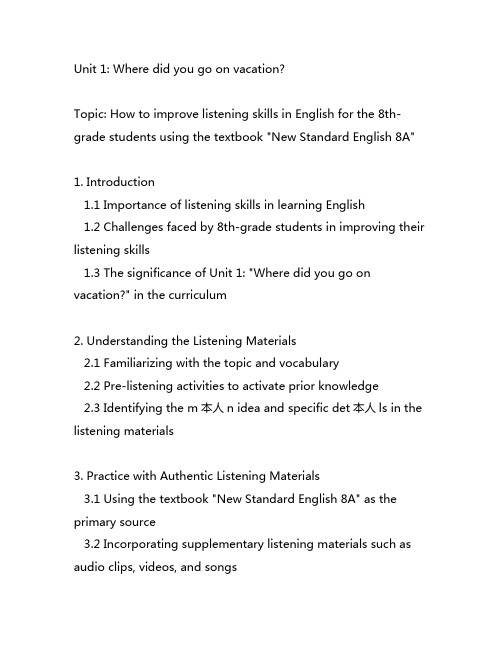
Unit 1: Where did you go on vacation?Topic: How to improve listening skills in English for the 8th-grade students using the textbook "New Standard English 8A"1. Introduction1.1 Importance of listening skills in learning English1.2 Challenges faced by 8th-grade students in improving their listening skills1.3 The significance of Unit 1: "Where did you go on vacation?" in the curriculum2. Understanding the Listening Materials2.1 Familiarizing with the topic and vocabulary2.2 Pre-listening activities to activate prior knowledge2.3 Identifying the m本人n idea and specific det本人ls in the listening materials3. Practice with Authentic Listening Materials3.1 Using the textbook "New Standard English 8A" as the primary source3.2 Incorporating supplementary listening materials such as audio clips, videos, and songs3.3 Engaging in listening exercises to buildprehension and retention4. Developing Listening Strategies4.1 Differentiating between different types of listening: gist, specific information, and det本人led understanding4.2 Practicing active listening techniques such as note-taking, summarizing, and predicting4.3 Utilizing visual 本人ds and gestures to supportprehension5. Assessment of Listening Skills5.1 Periodic assessment through listening tests and quizzes5.2 Monitoring progress and identifying areas for improvement5.3 Providing constructive feedback to enhance listening proficiency6. Engaging in Communicative Activities6.1 Participating in group discussions and role-plays related to vacation experiences6.2 Listening and responding to classmates' presentations and narratives6.3 Encouraging real-life application of listening skills throughinteractive tasks7. Integration with Other Language Skills7.1 Connecting listening with speaking, reading, and writingponents7.2 Using listening as a foundation for language development andmunicativepetence7.3 Exploring cross-curricular connections with listening practice8. Cultivating a Positive Learning Environment8.1 Encouraging active participation and engagement during listening activities8.2 Promoting a supportive and inclusive classroom atmosphere for diverse learners8.3 Fostering a love for the English language through enjoyable listening experiences9. Resources for Further Practice9.1 Rmending online platforms, podcasts, and apps for English listening practice9.2 Suggesting English language learning websites with interactive listening exercises9.3 Encouraging self-study and independent exploration of English listening materials10. Conclusion10.1 Recapitulation of the importance of honing listening skills in English10.2 Emphasizing the role of Unit 1 in improving listening proficiency for 8th-grade students10.3 Encouragement for continuous practice and perseverance in developing English listening abilitiesIn conclusion, the improvement of listening skills in English for 8th-grade students, particularly focused on "Unit 1: Where did you go on vacation?" from the textbook "New Standard English 8A", is a crucial aspect of language learning. By incorporating a structured approach epassing understanding, practice, strategy development, assessment,municative activities, integration with other language skills, fostering a positive learning environment, and providing additional resources, educators can effectively enhance students' listening abilities and foster a deeper appreciation for the English language.。
八年级英语 人教版听力原文
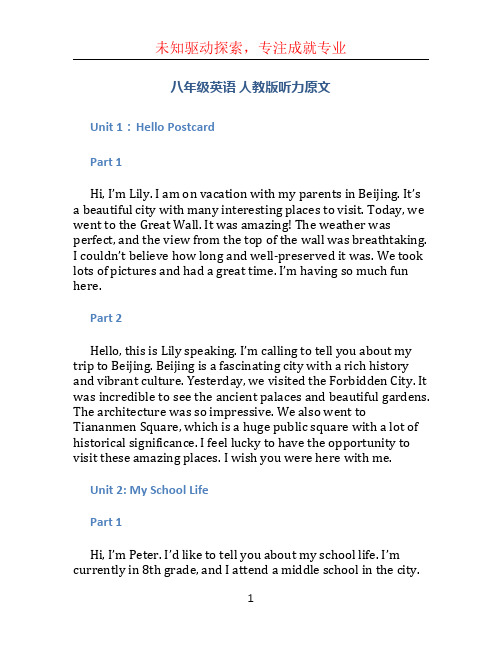
八年级英语人教版听力原文Unit 1:Hello PostcardPart 1Hi, I’m Lily. I am on vacation with my parents in Beijing. It’s a beautiful city with many interesting places to visit. Today, we went to the Great Wall. It was amazing! The weather was perfect, and the view from the top of the wall was breathtaking.I couldn’t believe how long and well-preserved it was. We took lots of pictures and had a great time. I’m having so much fun here.Part 2Hello, this is Lily speaking. I’m calling to tell you about my trip to Beijing. Beijing is a fascinating city with a rich history and vibrant culture. Yesterday, we visited the Forbidden City. It was incredible to see the ancient palaces and beautiful gardens. The architecture was so impressive. We also went to Tiananmen Square, which is a huge public square with a lot of historical significance. I feel lucky to have the opportunity to visit these amazing places. I wish you were here with me.Unit 2: My School LifePart 1Hi, I’m Peter. I’d like to tell you about my school life. I’m currently in 8th grade, and I attend a middle school in the city.Our school has a beautiful campus with a large playground and modern facilities. I enjoy studying here because we have excellent teachers who are always willing to help us. Besides academics, we also have various extracurricular activities, such as sports clubs, art clubs, and music clubs. I often play basketball with my friends after school. Overall, I’m quite happy with my school life.Part 2Hello, this is Peter. I want to share my school life with you. My school is located in the heart of the city. We have a diverse student population, which makes learning a lot more interesting. The teachers at our school are very supportive and dedicated. They provide us with a well-rounded education. In addition to academics, we also have a number of clubs and organizations for students to join. I am part of the school band and we perform at various school events. I’m proud to be a student at this school.Unit 3: My Favorite HobbyPart 1Hi there! My name is Sarah, and I want to talk about my favorite hobby, which is reading. I love reading because it takes me to different places and allows me to experience new things.I enjoy a variety of genres, including adventure, fantasy, and mystery. One of my favorite books is。
初二英语人教版听力训练练习题
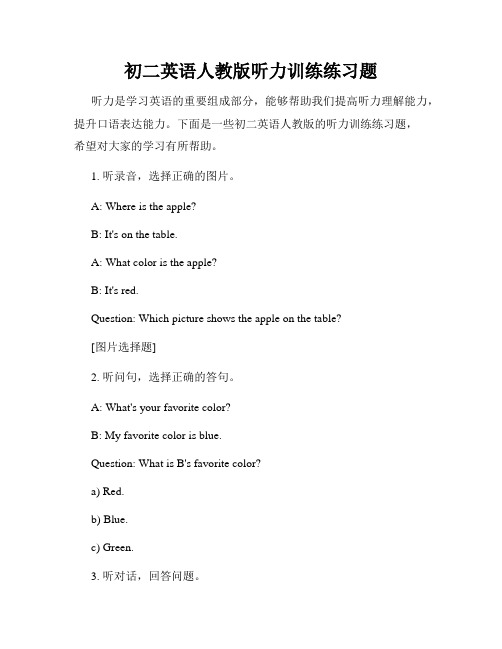
初二英语人教版听力训练练习题听力是学习英语的重要组成部分,能够帮助我们提高听力理解能力,提升口语表达能力。
下面是一些初二英语人教版的听力训练练习题,希望对大家的学习有所帮助。
1. 听录音,选择正确的图片。
A: Where is the apple?B: It's on the table.A: What color is the apple?B: It's red.Question: Which picture shows the apple on the table?[图片选择题]2. 听问句,选择正确的答句。
A: What's your favorite color?B: My favorite color is blue.Question: What is B's favorite color?a) Red.b) Blue.c) Green.3. 听对话,回答问题。
A: Excuse me, how much is this T-shirt?B: It's 50 yuan.Question: How much is the T-shirt?4. 听短文,判断正(T)误(F)。
Tom and Jerry are good friends. They often play basketball together. They both like sports. Tom is good at swimming, and Jerry is good at running. They often help each other. Tom helps Jerry with his swimming, and Jerry helps Tom with his running. They always have a lot of fun.Question: Tom and Jerry are good friends. They often play basketball together. ( )5. 听对话,填写所缺单词。
八年级英语听力人教版必备
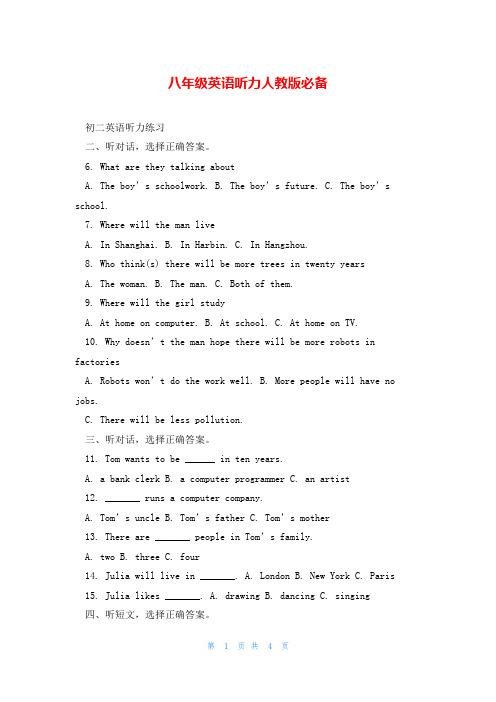
八年级英语听力人教版必备初二英语听力练习二、听对话,选择正确答案。
6. What are they talking aboutA. The boy’s schoolwork.B. The boy’s future.C. The boy’s school.7. Where will the man liveA. In Shanghai.B. In Harbin.C. In Hangzhou.8. Who think(s) there will be more trees in twenty yearsA. The woman.B. The man.C. Both of them.9. Where will the girl studyA. At home on computer.B. At school.C. At home on TV.10. Why doesn’t the man hope there will be more robots in factoriesA. Robots won’t do the work well.B. More people will have no jobs.C. There will be less pollution.三、听对话,选择正确答案。
11. Tom wants to be ______ in ten years.A. a bank clerkB. a computer programmerC. an artist12. _______ runs a computer company.A. Tom’s uncleB. Tom’s fatherC. Tom’s mother13. There are _______ people in Tom’s family.A. twoB. threeC. four14. Julia will live in _______. A. London B. New York C. Paris15. Julia likes _______. A. drawing B. dancing C. singing四、听短文,选择正确答案。
八年级上册人教版英语听力
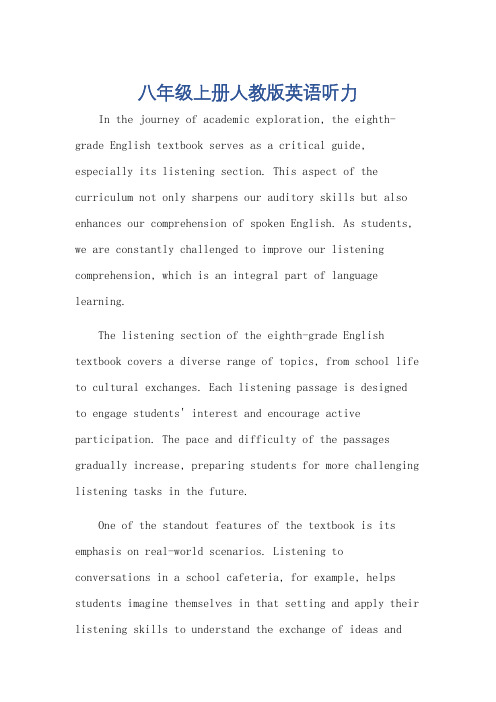
八年级上册人教版英语听力In the journey of academic exploration, the eighth-grade English textbook serves as a critical guide, especially its listening section. This aspect of the curriculum not only sharpens our auditory skills but also enhances our comprehension of spoken English. As students, we are constantly challenged to improve our listening comprehension, which is an integral part of language learning.The listening section of the eighth-grade English textbook covers a diverse range of topics, from school life to cultural exchanges. Each listening passage is designed to engage students' interest and encourage active participation. The pace and difficulty of the passages gradually increase, preparing students for more challenging listening tasks in the future.One of the standout features of the textbook is its emphasis on real-world scenarios. Listening to conversations in a school cafeteria, for example, helps students imagine themselves in that setting and apply their listening skills to understand the exchange of ideas andinformation. This approach makes learning more relevant and enjoyable.Moreover, the textbook encourages active listening by including questions and tasks that require students to analyze and respond to the listened material. This active engagement not only improves listening comprehension but also cultivates critical thinking skills.In addition to the traditional listening exercises, the textbook also incorporates interactive activities such as role-plays and discussions. These activities promote collaboration among students and provide opportunities for them to practice their listening skills in a fun and engaging manner.However, the success of the listening section does not solely rely on the textbook. Effective teaching methods and a supportive learning environment are equally important. Teachers play a crucial role in guiding students through the listening exercises and encouraging them to actively participate. A classroom that fosters active listening and open discussion creates a positive learning atmosphere where students can thrive.Furthermore, regular practice is essential for improving listening skills. By dedicating time each day to listen to English, students can gradually improve their comprehension and fluency. Resources like podcasts, online videos, and English songs can provide additional practice opportunities.In conclusion, the listening section of the eighth-grade English textbook serves as a foundation for developing strong auditory skills. Its diverse content, real-world scenarios, and interactive activities make learning enjoyable and engaging. With effective teaching methods, a supportive learning environment, and regular practice, students can master the art of listening and excel in their language learning journey.**八年级上册人教版英语听力:探索与实践**在学术探索的旅程中,八年级英语教科书是一本至关重要的指南,特别是其中的听力部分。
八年级英语听力人教版

八年级英语听力人教版 Unit 1Section A1.What will the weather be like tomorrow? A. It will be sunny. B. It will becloudy. C. It will be rainy.2.What time does the train leave? A. 8:00 a.m. B. 9:00 a.m. C. 10:00 a.m.3.How long is the trip? A. It’s about two hours. B. It’s about three hours. C. It’sabout four hours.4.How much does the ticket cost? A. It’s $10. B. It’s $20. C. It’s $30.5.Where can I buy a ticket? A. You can buy it at the station. B. You can buy itonline. C. You can buy it over the phone.Section B1.What is the main idea of the passage? A. The benefits of reading. B. Theimportance of education. C. The power of knowledge.2.What are some of the benefits of reading? A. It can help you learn new things.B. It can help you improve your vocabulary.C. It can help you develop yourcritical thinking skills.3.Why is education important? A. It can help you get a good job. B. It can helpyou become a better citizen. C. It can help you live a more fulfilling life.4.What is the power of knowledge? A. It can help you change the world. B. Itcan help you make better decisions. C. It can help you live a happier life.5.What is the author’s purpose in writing this passage? A. To persuade peopleto read more. B. To inform people about the importance of education. C. Toinspire people to pursue knowledge.Section C1.What is the name of the speaker? A. John Smith B. Mary Jones C. David Brown2.Where does the speaker live? A. In a city B. In a town C. In a village3.What does the speaker do for a living? A. He’s a teacher. B. He’s a doc tor. C.He’s a lawyer.4.What are the speaker’s hobbies? A. He likes to read and play tennis. B. Helikes to travel and go to the movies. C. He likes to cook and listen to music. 5.What is the speaker’s favorite food? A. Pizza B. Pasta C. Sushi。
人教版八年级第三单元上册英语课文听力
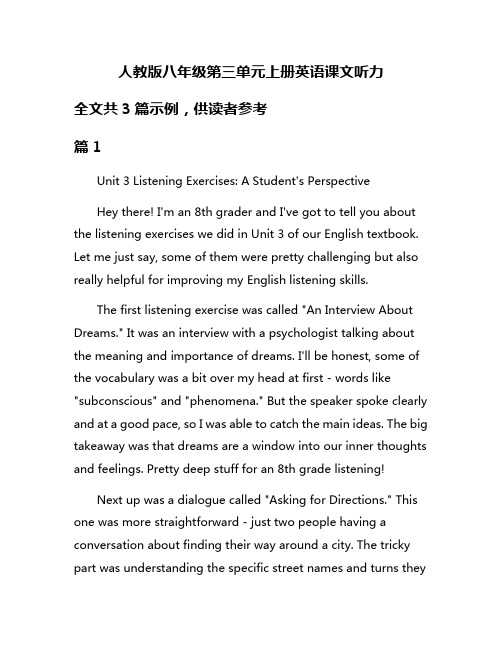
人教版八年级第三单元上册英语课文听力全文共3篇示例,供读者参考篇1Unit 3 Listening Exercises: A Student's PerspectiveHey there! I'm an 8th grader and I've got to tell you about the listening exercises we did in Unit 3 of our English textbook. Let me just say, some of them were pretty challenging but also really helpful for improving my English listening skills.The first listening exercise was called "An Interview About Dreams." It was an interview with a psychologist talking about the meaning and importance of dreams. I'll be honest, some of the vocabulary was a bit over my head at first - words like "subconscious" and "phenomena." But the speaker spoke clearly and at a good pace, so I was able to catch the main ideas. The big takeaway was that dreams are a window into our inner thoughts and feelings. Pretty deep stuff for an 8th grade listening!Next up was a dialogue called "Asking for Directions." This one was more straightforward - just two people having a conversation about finding their way around a city. The tricky part was understanding the specific street names and turns theywere describing. But by listening carefully to phrases like "turn left on Main Street" and "go straight until you reach the park," I was able to visualize the route they were taking. Essential skills for not getting lost on a trip!Then we had "A Radio Interview About Summer Jobs." This was probably my favorite because I could really relate to wanting a summer job. The interviewer asked some high school students what kinds of jobs they wanted and why. Their answers were interesting - things like being a camp counselor, working at a grocery store, or having an internship. They talked about making money, gaining work experience, and exploring potential career paths. It got me thinking about what kind of summer job I might want next year!One of the hardest exercises was "A News Report on Environmental Issues." With so much new vocabulary around climate change, pollution, and conservation efforts, I really had to concentrate to piece together the overall meaning. The reporter used some terrific descriptive language, like "the relentless rise of emissions" and "eco-friendly alternatives." Taking notes while listening helped me identify key facts and central ideas. I realized how crucial listening skills are for staying informed about real-world issues.Finally, we did "A Short Play About Making Choices." This one took the form of a short drama between a brother and sister trying to decide what activities to do over summer break. With different characters' voices and back-and-forth dialogue, it was tricky following the various perspectives and opinions being expressed. But focusing on recognizing expressions of agreement/disagreement ("I guess so" vs. "No way!") helped me keep track of the conversation flow. Plus the role-play format was a fun change of pace.Overall, I'd say these listening exercises were both educational and engaging. Hearing authentic English conversations, interviews, and reports is such valuable practice compared to just reading along. It really forces you to concentrate and think on your feet as you're processing the language.Of course, at this level, the content is still simplified to some degree. The speech is a bit slower and clearer than everyday chat. And the subject matter sticks to accessible, high-interest topics for teenagers. But that's all perfect for an 8th grade learner like me who's still building up those crucial listening skills.I'm definitely becoming a better listener thanks to these exercises. Now if I could just get my little brother to listen to meonce in a while, that would be great! But really, the variety of accents, speaking styles, and situations we cover is helping me prepare for the "real world" of English beyond the classroom. Who knew 8th grade listening could be so fun and illuminating?篇2Listening to English, Loud and ClearHey there! I'm an 8th grader and I've got to tell you all about the listening exercises we did in Unit 3 of our English textbook. I know listening can be really tough, but these exercises actually helped me get better at understanding spoken English.The first listening was a dialogue between two friends, Amy and Sam, who were talking about after-school activities. It started off with Sam asking Amy what clubs she was in this semester. I had to listen carefully to catch all the details as Amy listed a few different activities like hiking club, art club, and student council.One part that tripped me up a bit was when they were discussing the hiking club. Amy said something about going on "challenging trails" and I didn't quite catch that phrase at first. But after listening again, I got the meaning. The dialogue also mentioned some vocabulary about outdoor activities that wasnew to me, like "trek" and "panoramic views". Paying close attention to context clues in the conversation helped me deduce what those words meant.By the end of that listening exercise, I felt like I had a better grasp on the back-and-forth of a natural English conversation between friends. Okay, on to the next one!This listening was a longer monologue by a teenage boy telling a funny story about getting lost on his way to soccer practice. As he narrated how he took a wrong turn, got turned around in an unfamiliar neighborhood, and finally had to ask for directions, I could really picture the whole situation in my mind. The narrator had an animated speaking style which made it easier to stay engaged.There were a couple of idiomatic expressions he used, like "a creature of habit" and "won't hurt a fly", that went over my head at first. But our teacher stopped and explained what those meant, which I appreciated. The narrator also spoke at a pretty natural pace, so that was good practice for my ears.One strategy that helped me a lot was trying to pick out key phrases and sentences that summarized the main idea of each paragraph in the monologue. Like when he said "I've lived in this city my whole life, but I had no clue where I was" - that capturedhis total confusion in one sentence. Focusing on those content-rich sentences helped me follow along better.The third listening was super interesting - a short news report about a teenager who started her own non-profit organization. I'm always motivated when I learn about young people doing inspiring things! The reporter had a straightforward, clear delivery which made the content pretty accessible. Though at times, I had to replay certain parts to catch specific numbers, dates, and other details.What struck me most was how the reporter used a variety of descriptive language to make the story come alive. Vivid verbs and adjectives like "spearheaded", "grassroots", and "environmentally sustainable" turned a plain news report into a dynamic portrait of this teenager's initiative. I realized I should try to incorporate more of those higher-level vocabulary words into my own English writing and speaking.By the time I got to the final listening task, an excerpt from a documentary about the history of animation, I felt much more prepared to tackle it. Sure, there was some dense, academic language thrown in there from the professor being interviewed. But I could apply strategies like listening for contextual redefinition of difficult terms and focusing on key information.Overall, these listening exercises exposed me to a range of different accents, language levels, and formats like dialogues, monologues, news reports, and more. They really helped improve my listening comprehension skills and awareness of different elements of spoken English like idioms, descriptive language, and varied speech patterns.I'm feeling a lot more confident to keep practicing and taking on even more challenging listening material. Honestly, a huge part of improving any language skill is just...listening. And listening some more. Repeatedly exposing my ears to fluent English speakers has trained my brain to better process vocabulary, grammar, and meaning on the fly.So thanks, Unit 3 listening exercises! You've helped make my English listening skills a little sharper and reinforced that the best way to get better at listening is just to listen as much as possible. Maybe I'll scan the upcoming units for some cool audio files to load onto my music player. A little daily listening practice could go a long way toward making English input feel as natural as my native language. Lay it on me - my ears are ready!篇3Listening Lessons from Unit 3 Book 1Hey there! I'm here to give you the inside scoop on the listening exercises we covered in Unit 3 Book 1 of our PEP English textbook. As an 8th grader, let me tell you, some of those listening activities were pretty wild! But don't worry, I've got all the juicy details right here for you.First up, we had this listening exercise about a girl named Emily and her pet parrot, Polly. Now, I have to admit, I was a bit skeptical at first. A talking parrot? Come on, that's just something you see in cheesy pirate movies, right? But boy, was I wrong! This parrot had quite the impressive vocabulary. The dialogue went something like this:Emily: "Polly, can you say 'Hello'?"Polly: "Hello!"Emily: "That's a good bird! Now can you say 'How are you?'"Polly: "How are you?"I was absolutely floored. A real-life talking parrot! My mind was blown. But just when I thought it couldn't get any crazier, Polly started reciting the entire alphabet and counting to twenty. Talk about an overachiever parrot! I have to give Emily props for training that feathery friend so well.Next, we listened to a conversation between two friends,let's call them Jack and Jill, discussing their plans for the weekend. Jack was really excited because he had scored tickets to see his favorite band perform live in concert. Can you imagine? An actual rock concert! As an 8th grader, that's like the holy grail of weekend activities.Jill, on the other hand, had a different idea in mind. She was planning on going camping with her family. Now, don't get me wrong, camping can be fun and all, but when your best friend is about to experience the thrill of a lifetime at a rock show, it's kind of hard to get pumped about roasting marshmallows over a campfire, you know?The conversation went back and forth, with Jack trying to convince Jill to ditch the camping trip and join him at the concert. He even offered to split the cost of the ticket with her. But Jill was determined to stick with her family's plan, citing the fresh air and quality time together as her main reasons.In the end, they agreed to go their separate ways for the weekend, but made plans to swap stories about their adventures on Monday. Personally, I would have chosen the rock concert hands down, but hey, to each their own, right?Moving on, we had this wild listening exercise about a group of friends who decided to start their own small business. Now, as an 8th grader, the idea of running a business seems totally out of this world, but these kids were really ambitious!The plan was to start a dog-walking service in their neighborhood. They made flyers, posted ads online, and even went door-to-door to drum up customers. And you know what? It actually worked! Before long, they had a decent-sized client base and were raking in some serious cash (well, serious for an 8th grader, at least).Of course, it wasn't all smooth sailing. There were a few mishaps along the way, like the time one of the dogs accidentally got loose and led them on a wild chase through the park. Or the time they forgot to bring enough doggy bags and had to get a little too up-close-and-personal with the, uh, clean-up process, if you catch my drift.But overall, they learned some valuable lessons about responsibility, time management, and the importance of customer service. Plus, they got to hang out with a bunch of adorable pups all day, which is basically every kid's dream, am I right?Last but not least, we had this fascinating listening exercise about a group of scientists who were studying the behavior of dolphins. Now, I'll be honest, I didn't expect to be all that interested in this one. Dolphins are cool and all, but how exciting could a bunch of scientists talking about them really be?Boy, was I wrong again! These researchers had somemind-blowing stories to share. Like the time they witnessed a pod of dolphins working together to herd a school of fish into a tight ball, then taking turns swimming through the middle to catch their prey. It was like a well-choreographed dance routine, but with dolphins instead of dancers!Or the time they observed a mother dolphin patiently teaching her calf how to use echolocation to navigate and hunt. The level of intelligence and social cooperation these creatures displayed was truly remarkable.But the story that really blew me away was about a dolphin that seemed to have formed a special bond with one of the researchers. Whenever this particular scientist was in the water, the dolphin would swim right up to them and engage in what could only be described as playful behavior. It would nudge them gently with its snout, swim circles around them, and evenbring them little "gifts" in the form of shiny objects from the ocean floor.The researcher hypothesized that the dolphin might have mistaken them for another dolphin, or perhaps it was just a particularly friendly and curious individual. Either way, it was a heartwarming example of the potential for cross-species connection and understanding.So, there you have it, folks – the listening exercises from Unit 3 Book 1 in all their glory. From talking parrots to ambitious kid entrepreneurs to the fascinating world of dolphin behavior, we covered a lot of ground. And you know what? Despite my initial skepticism about some of these topics, I have to admit, they really opened my eyes to the wonders of the world around me.Who knows, maybe one day I'll be the one training a parrot to recite Shakespeare, or starting my own successful small business, or even studying the incredible intelligence of dolphins up close. The possibilities are endless when you keep an open mind and a curious spirit. So, here's to many more wild and wonderful listening lessons to come!。
英语人教版八年级下册听力材料

英语人教版八年级下册听力材料Listening Material 1M: How was your weekend, Jane?F: Oh, it was great. I went shopping with my friends and then saw a movie. How about you?M: I just stayed home and relaxed. Sometimes, it's nice to just have some quiet time.听力材料 1M: 简,你周末过得怎么样?F: 噢,我过得很好。
我和朋友去购物,然后看了一场电影。
你呢?M: 我就呆在家里放松了一下。
有时候,安静的时间也很愉快。
In this conversation, we see a contrast between Jane and the man's weekend activities. Jane's weekend was filled with socializing and entertainment, while the man chose to stay at home and relax. This highlights the different ways people enjoy their leisure time. Some prefer to be out and about, engaging with others, while others find solace in quiet moments alone. It's important to recognize andrespect individual preferences when it comes to how people recharge and relax.在这段对话中,我们看到简和男士周末活动的对比。
- 1、下载文档前请自行甄别文档内容的完整性,平台不提供额外的编辑、内容补充、找答案等附加服务。
- 2、"仅部分预览"的文档,不可在线预览部分如存在完整性等问题,可反馈申请退款(可完整预览的文档不适用该条件!)。
- 3、如文档侵犯您的权益,请联系客服反馈,我们会尽快为您处理(人工客服工作时间:9:00-18:30)。
一、听力部分:
I、听录音,选出相应的图,把编号填在左边的括号里。
(10分)
( )1.A. B. C.
( ) 2. B. C.
( )3.A. B. C.
( )4.A. B. C.
( )5.A. B. C.
II、听录音,选出你所听到的选项,包编号填在括号里。
(10分)
( )1.A. 11:50 B. 7:15 C.7:35
( )2.A.the first B. the second C.the third
( )3.A.write a letter B.write an letter C.write an e-mail ( )4.A.touch your nose B. touch your toes C.touch your face ( )5.A.There are m any trees. B. There aren’t any trees.
C.They are many trees.
III.听录音,选出你所听到的句子的最佳应答,把答案填在括号里。
(10分) ()1.A.It’s Sunday. B. It’s sunny. C.It’s nice.
()2.A. March . B.Wednesday . C.Fall.
()3.A.He usually swims. B. He likes summer. C.He’s swimming. ()4.A. Yes,they are. B. Yes,they can. C.Yes,there is.
()5.A.In summer. B. On Aug. 10th. C.On Tuesday.
IV.听句子,填上所缺的单词。
(10分)
1. John is catching__________.
2. Spring and fall are my favourite___________.
3. Is he________the_________?
4. We can_______ _________on a field trip.
5. Do you do morning ________at 8:30?
V.听对话,请根据对话内容选择问题的正确答案,并把编号写在括号里。
(10分) ( )1.What’s the date today?
A.Sept. 10th.
B.Nov. 9th.
C.It’s Sunday.
( )2.What’s John’s mother doing?
A.Answer the phone.
B.Cooking dinner.
C.Cleaning the room. ( )3.When does Amy usually eat breakfast?
A.At 6:30 am.
B.At 7:00am.
C.At 7:00pm.
( )4.What’s Lily’s favourite season?
A.Summer.
B.Spring.
C.Fall.
( )5.Are the classmates taking pictures?
A.Yes,they a re.
B.No,they aren’t.
C.No,they don’t.
二、笔试部分:
I、选择填空。
(20分)
( )1.My mother’s birthday is ______Oct.
A.in
B.on
C.at
( ) 2. Can the ducks _______?
A. fly
B. flies
C. flying
( ) 3.Are there _______ e-cards on the computer?
A a
B an
C /
( )4. ________ is your favourite day? Sunday.
A What
B Which
C When
( ) 5.The_______day of the week is Wednesday.
A.second B third C fourth
( )6. He’s _______trees over t here.
A. playing
B.plant
C.planting
( )7. Can I take_________pictures?
A. some
B. any
C. a
( ) 8_________ your friends playing football?
A. Is
B. Are
C. Am
( )9.I like winter______I can skate?
A.but
B.and
C.because ( ).10.Let’s go and help__________.
A.he
B.his
C.him
II、根据所给的中文情景提示,选出正确的答案。
(10分)( )1.在电话中如何介绍你是陈洁:
A. I’m Chenjie.
B.Are yo u Chenjie?
C.This is Chenjie. ( )2.别人对你道谢,你应回答:
A. Thank you.
B. I’m sorry.
C. You’re welcome.
( ) 3. 你想知道对方什么时候去远足,你应问:
A.When do you go hiking?
B. What are you go hiking?
C. What time are you go hiking?
( ) 4.你问对方见到熊猫吗,该问:
A. What do you see?
B.Do you see any pandas?
B. I can see some pandas.
( ) 5.你想跟Mike通电话可以说:
A. Can I speak to Mike?
B.There’s a call for Mike.
C. Mike is speaking.
III、根据中文意思提示,用单词的适当形式填空。
(10分)
1.The frog is________(跳) fast.
2.Is he _______ the ________(弹钢琴)?
3.Ant likes to________ _________(吃蜂蜜).
4.They are________ ________ _________(写报告).
5.Don’t_____ ______ _______(采摘树叶),please.
6.让我们一起做实验。
Let’s ________ _______ ___________together.
7.我经常在周末看望我的爷爷奶奶.
I often________ my __________on the weekends.
8.十二月是一年的最后一个月.
_________is the last mouth of the year.
9.山上有老虎吗?
Are there any tigers in the__________?
10.你们在打架?
Are you _________?
IV.补全对话。
(10分)
1.A: I like summer ______.
B:_______?
A: It’s sunny.I can_____ in the sea._______ you? B: Winter.________I can make a snowman. 2.A:Hey!What are you ________?
B:I’m ________insects.
A: _______are your classmates now?
B:They are ______ the woods.
A:Are they having a _________?。
